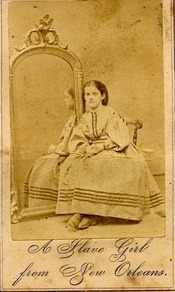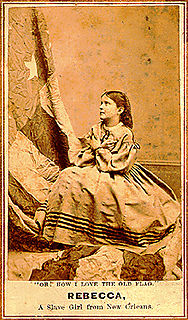 Louisiana Atrocity or the Slave Tale Tragedy is one young woman’s story of her life in New Orleans, as the secret mistress of a rich, powerful and respected local Judge. The article was published in the Atlantic Monthly and derived from an interview with General Benjamin Butler. The story line is poignant, because it was not only a common occurrence in Louisiana, but throughout Slavedom, while that peculiar institution existed in this nation. Alfred Burnett relates the following, as told by Butler, in Burnett’s Incidents of War.
Louisiana Atrocity or the Slave Tale Tragedy is one young woman’s story of her life in New Orleans, as the secret mistress of a rich, powerful and respected local Judge. The article was published in the Atlantic Monthly and derived from an interview with General Benjamin Butler. The story line is poignant, because it was not only a common occurrence in Louisiana, but throughout Slavedom, while that peculiar institution existed in this nation. Alfred Burnett relates the following, as told by Butler, in Burnett’s Incidents of War.
Just previous to the arrival of General Banks at New Orleans, I was appointed Deputy Provost-Marshal of the city, and held the office for some days after he had assumed command. One day, during the last week of our stay in the South, a young woman of about twenty years called upon me to complain that her landlord had ordered her out of her house, because she was unable longer to pay the rent, and she wished me to authorize her to take possession of one of her father’s houses that had been confiscated, he being a wealthy rebel, then in the Confederacy, and actively engaged in the rebellion.
The girl was a perfect blonde in complexion; her hair was of a very pretty light shade of brown, and perfectly straight; her eyes a clear, honest gray; and her skin as delicate and fair as a child’s. Her manner was modest and ingenuous, and her language indicated much intelligence. Considering these circumstances, I think I was justified in wheeling around in my chair, and indulging in an unequivocal stare of incredulous amazement, when, in the course of conversation, she dropped a remark about having been born a slave.
“Do you mean to tell me,” said I, “that you have negro blood in your veins?” And I was conscious of a feeling of embarrassment at asking a question so apparently preposterous. “Yes,” she replied, and then related the history of her life, which I shall repeat as briefly as possible: “My father,” she commenced, “is Mr. Cox, formerly a judge of one of the courts in this city. He was very rich, and owned a great many houses here. There is one of them over there,” she remarked, naively, pointing to a handsome residence opposite my office in Canal Street. ” My mother was one of his slaves.”
 “When I was sufficiently grown, he placed me at school, at the Mechanics’ Institute Seminary, on Broadway, New York. I remained there until I was about fifteen years of age, when Mr. Cox came on to New York and took me from the school to a hotel, where he obliged me to live with him as his mistress; and to-day, at the age of twenty-one, I am the mother of a boy five years old, who is my father’s son. After remaining some time in New York, he took me to Cincinnati and other cities at the North, in all of which I continued to live with him as before. During this sojourn in the Free States I induced him to give me a deed of manumission; but on our return to New Orleans he obtained it from me and destroyed it.”
“When I was sufficiently grown, he placed me at school, at the Mechanics’ Institute Seminary, on Broadway, New York. I remained there until I was about fifteen years of age, when Mr. Cox came on to New York and took me from the school to a hotel, where he obliged me to live with him as his mistress; and to-day, at the age of twenty-one, I am the mother of a boy five years old, who is my father’s son. After remaining some time in New York, he took me to Cincinnati and other cities at the North, in all of which I continued to live with him as before. During this sojourn in the Free States I induced him to give me a deed of manumission; but on our return to New Orleans he obtained it from me and destroyed it.”
“At this time I tried to break off the unnatural connection, whereupon he caused me to be publicly whipped in the streets of the city, and then obliged me to marry a colored man; and now he has run off, leaving me without the least provision against want or actual starvation, and I ask you to give me one of his houses, that I may have a home for myself and three little children.”
Strange and improbable as this story appeared, I remembered, as it progressed, that I had heard it from Governor Shepley, who, as well as General Butler, had investigated it, and learned that it was not only true in every particular, but was perfectly familiar to the citizens of New Orleans, by whom Judge Cox had been elected to administer justice. The clerks of my office, most of whom were old residents of the city, were well-informed in the facts of the case, and attested the truth of the girl’s story.
I was exceedingly perplexed, and knew not what to do in the matter; but, after some thought, I answered her thus: “This department has changed rulers, and I know nothing of the policy of’ the new commander. If General Butler were still in authority, I should not hesitate a moment to grant your request; for, even if I should commit an error of judgment, I am perfectly certain he would overlook it, and applaud the humane impulse that prompted the act; but General Banks might be less indulgent, and make very serious trouble with me for taking a step he would perhaps regard as unwarrantable.” I still hesitated, undecided how to act, when suddenly a happy thought struck me, and, turning to the girl, I added, “To-day is Thursday: next Tuesday I leave this city with General Butler for a land where, thank God! such wrongs as yours can not exist; and, as General Banks is deeply engrossed in the immediate business at headquarters, he will hardly hear of my action before the ship leaves-so I am going to give you the house.”
I am sure the kind-hearted reader will find no fault with me that I took particular pains to select one of the largest of her father’s houses, (it contained forty rooms,) when she told me that she wanted to let the apartments as a means of support for herself and her children. My only regret in the case was that Mr. Cox had not been considerate enough to leave a carriage and a pair of bays on my hands, that I might have had the satisfaction of enabling his daughter to disport herself about the city in a style corresponding to her importance as a member of so respectable and wealthy a family.
This Slave Tale Tragedy, was not just a Louisiana Atrocity, but was endemic throughout the South and a way of life for many women of African-American heritage.
Bummer


As a native or Louisiana I challenge you to back up this story with the proof! And your false statement that this occurred all over the South. My ancestors came there shortly after the Louisiana purchase and have many descendants in Louisiana. I couldn’t help but see how this poor girl and her children suffered because of the yankee invasion, and the Yankee General Butler was hated by all. He had a grand time giving away a house to her that wasn’t his to give… The occupiers under Butler stole, looted, murdered, and destroyed that is the real Atrocity and the elephant in the room.
Josephine Bass
This “old guy” has ancestors from Tennessee, Mississippi and several other southern states. Their journals and diaries of the era support the atrocities of neighboring land owners. Photographic evidence of the “mixed blood” property of “slavedom” speaks for itself. Couldn’t agree with you more in your analysis of Butler, the “Beast” could be tyranical, however in the case that Burnett quoted from the “Atlantic Journal” General Butler was too lenient, Bummer would have hung some of the Incestuous Pedophiles.Thanks for sharing Josephine and hope your ancestors didn’t partake of this type of outrage, an affront to God’s Law in many ways.
Bummer